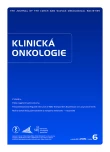-
Medical journals
- Career
Psychological Aspects of Intravenous Treatment in Oncology and Permanent Venous Access Devices Tolerance
Authors: J. Jokl 1; K. Slováčková 1; V. Maňásek 2; Vl. Maňásek 3
Authors‘ workplace: Oddělení klinické psychologie, Komplexní onkologické centrum Nový Jičín, Nemocnice Nový Jičín a. s. 1; Oddělení onkologie, Komplexní onkologické centrum Nový Jičín, Nemocnice Nový Jičín a. s. 2; Katedra intenzivní medicíny a forenzních oborů, LF OU v Ostravě 3
Published in: Klin Onkol 2015; 28(6): 426-430
Category: Original Articles
doi: https://doi.org/10.14735/amko2015426Overview
Background:
This paper deals with the psyche of patients during intravenous therapy. Since any intervention in the physical integrity of individuals are necessarily reflected in their mental level, we decided to conduct a survey dealing with tolerance of intravenous therapy in cancer patients. Especially, we focused on long-term venous access devices tolerance.Patients and Methods:
The aim of this study was to evaluate descriptively patients´ awareness of the administration of parenteral drugs, risks in the application and the differences between the administration of drugs to the central and peripheral venous system. To collect data, own questionnaire containing 21 questions was compiled. It was distributed to patients in the oncology department and outpatient oncology ward at the hospital Novy Jicin. Patients signed an informed consent for data collection. One hundred valid questionnaires were evaluated in the analysis of the data.Results:
The results of the study generally indicate that patients do not tolerate venous sampling and intravenous therapy optimally. Patients who have some form of venous access device are mostly satisfied, as it fulfills its mandate of maximum patient comfort.Conclusion:
The results indicate that most patients know alternatives to peripheral drugs application. However, awareness of this issue is inadequate. The vast majority of patients would recommend the introduction of long-term venous access device to other patients.Key words:
vascular access devices – intravenous administration – psychological adaptation – drug tolerance
The authors declare they have no potential conflicts of interest concerning drugs, products, or services used in the study.
The Editorial Board declares that the manuscript met the ICMJE recommendation for biomedical papers.Submitted:
8. 7. 2015Accepted:
4. 10. 2015
Sources
1. Kupka M. Vybrané kapitoly z kulturní antropologie. 1. vyd. Olomouc: Univerzita Palackého v Olomouci 2007.
2. Praško J. Úzkostné poruchy. Praha: Portál 2005.
3. Hartl P, Hartlová H. Velký psychologický slovník. Praha: Portál 2010 : 554.
4. Praško J, Prašková H, Prašková J. Specifické fobie. 1. vyd. Praha: Portál 2008.
5. Kendler KS, Neale MC, Kessler RC et al. The genetic epidemiology of phobias in women: the interrelationship of agoraphobia, social phobia, situational phobia, and simple phobia. Arch Gen Psychiatry 1992; 49(4): 273 – 281.
6. Öst LG. Blood and injection phobia: background and cognitive, physiological, and behavioral variables. J Abnorm Psychol 1992; 101(1): 68 – 74.
7. Seligman M. Phobias and preparedness. Behavior Therapy 1991; 2 : 307 – 320.
8. Praško J, Vyskočilová J, Prašková J. Úzkost a obavy: jak je překonávat. Praha: Portál 2008.
9. Ditto B, France CR, Holly C. Applied tension may help retain donors who are ambivalent about needles. Vox Sanguinis 2009; 98(3 Pt 1): e225 – e230.
10. Nešpor K. Bolest se dá zvládnout. Praha: Nakladatelství Lidové noviny 2004.
11. Janáčková L. Bolest a její zvládání. Praha: Portál 2007 : 18.
12. Opavský J. Bolest v ambulantní praxi. 1. vyd. Praha: Maxdorf 2011.
13. Maňásek V. Žilní vstupy pro aplikaci léčiv. Nepublikovaná bakalářská práce: Ostravská univerzita v Ostravě 2015.
14. Haškovcová H. Lékařská etika. 4. vyd. Praha: Galén 2015.
15. Angenendt G, Schütze ‑ Kreilkamp U, Tschuschke V. Psychoonkologie v praxi: psychoedukace, poradenství a terapie. Praha: Portál 2010.
16. Nagy M. The child’s theories concerning dech. J Genet Psychol 1948; 83 : 199 – 216.
17. Kupka M. Psychologické aspekty paliativní péče. Olomouc: Univerzita Palackého v Olomouci 2011.
18. Haškovcová H. Thanatologie. Praha: Galén 2007.
19. Vymětal J. Lékařská psychologie. Praha: Portál 2003.
20. Křivohlavý J. Psychologie nemoci. Praha: Grada 2002.
21. Kalvodová L [online]. Psychika onkologického pacienta během léčby. [aktualizováno 14. září 2010; citováno 30. června 2015]. Dostupné z: https:/ / www.mojemedicina.cz/ pro‑pacienty/ pece o pacienta/ psychologicka podpora pacientu/ psychika onkologickeho pacienta behem lecby/ .
22. Mikšová Z et al. Kapitoly z ošetřovatelské péče. Praha: Grada 2006.
23. Puchmayer V, Roztočil K et al. Praktická angiologie. 2. vyd. Praha: Triton 2003 : 207.
Labels
Paediatric clinical oncology Surgery Clinical oncology
Article was published inClinical Oncology

2015 Issue 6-
All articles in this issue
- Triple Negative Breast Cancer
- Immunotherapy for the Prevention and Treatment of Breast Cancer
- Psychological Aspects of Intravenous Treatment in Oncology and Permanent Venous Access Devices Tolerance
- A Case of Delayed Diagnosis of Acral Lentiginous Melanoma
- Possible Pitfalls of Ipilimumab Therapy in Malignant Melanoma – a Case Report
- Thiazolidinediones Regulate the Level of ABC Transporters Expression on Lung Cancer Cells
- Clinical Oncology
- Journal archive
- Current issue
- Online only
- About the journal
Most read in this issue- A Case of Delayed Diagnosis of Acral Lentiginous Melanoma
- Triple Negative Breast Cancer
- Immunotherapy for the Prevention and Treatment of Breast Cancer
- Psychological Aspects of Intravenous Treatment in Oncology and Permanent Venous Access Devices Tolerance
Login#ADS_BOTTOM_SCRIPTS#Forgotten passwordEnter the email address that you registered with. We will send you instructions on how to set a new password.
- Career

